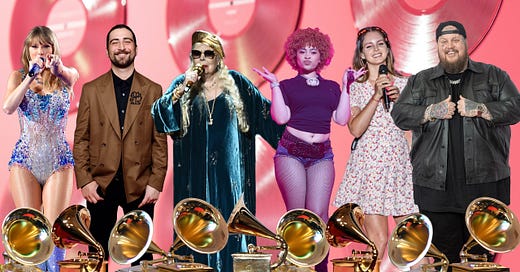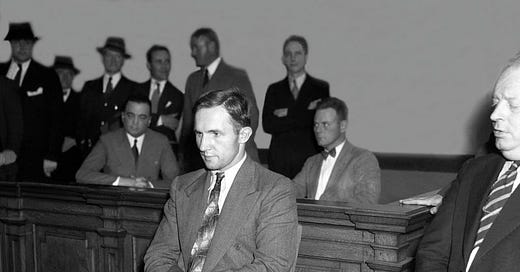
The Free Press

It’s ladies’ night at the Grammys this year, with female solo acts like Billie Eilish, SZA, and Olivia Rodrigo duking it out in the heavyweight categories. And, of course, Taylor Swift. Will the Swift juggernaut keep on rolling? Surely!
Then there’s Barbie. The feminist doll–industrial complex is hoping it can squeeze a little more juice out of the movie that captured the zeitgeist last summer and refuses to let go. Songs from the soundtrack have eleven nominations in total, including two nominations in the Song of the Year category, “Dance the Night” by Dua Lipa and “What Was I Made For?” by Billie Eilish.
What else is happening at the Grammys tomorrow? An eighty-year-old Joni Mitchell will perform at the show for the first time. (More on her in a second.)
Also performing, for the first time in years: Tracy Chapman. You may remember last year’s very silly kerfuffle over her hit “Fast Car,” when the (straight, white—Southern!—male) star Luke Combs topped the country chart with a cover version of the song. This made Chapman the first black woman to have a solo songwriting credit on a number one country hit. Good news! Progress! No, no. According to a Washington Post piece, the response to the song was “complicated” and “clouded by the fact that, as a Black queer woman, Chapman, 59, would have almost zero chance of that achievement herself in country music.”
Evan Gardner explained why attempts to pit Combs and Chapman against each other were doomed from the start in a great piece on country music for us last year:
Even as his accent tells you that his is a different story than Chapman’s, the words remind you that it’s the same. The car he and Chapman sing of is equal parts sweet chariot and Ford F-150. They are both racing to the same place, and that place is freedom and self-realization, both beautiful and uncontainable.
That shared journey will be clear tomorrow night when, according to Variety, Combs and Chapman will sing “Fast Car” onstage together. We’re looking forward to that—and more.
Today, Free Pressers look ahead to music’s biggest night of the year. We have Evan on the best new artists, Julia Steinberg on Lana Del Rey, and Peter Savodnik with some recommendations for those who prefer their music centuries old.
But first, here’s Eli Lake on why Joni Mitchell’s too good for the Grammys. . .
Authenticity is in
Evan Gardner on the realness of the nominees for Best New Artist.
Merriam-Webster picked authentic as their word of the year for 2023. And our hunger for authentic musical artists has never been greater. Just look at the surprise success of complete outsider Oliver Anthony, whose country song “Rich Men North of Richmond” shot to the top of the charts out from of nowhere. Or look at the nominees for Best New Artist at the Grammys tomorrow night.
Where this category once rewarded whichever up-and-coming star had nailed the formula for a pop hit with the broadest possible appeal, this year, whoever wins, the title will go to someone with their own authentic music. The new artist nominees make music that is a collage of their own unique lives and sounds. Meet the front-runners:
Jelly Roll
For Jelly Roll (born Jason DeFord), a 39-year-old former drug dealer from Antioch, Tennessee (just outside of Nashville), who was in and out of detention centers for ten years and did his first stint at 14, music is primarily an emotional exercise: he channels a life of pain, drugs, and crime into his work. Hip-hop was the obvious way for Jelly Roll to tell his story. And that’s the kind of music he made until 2020, when he released “Save Me,” a stripped-down demo where he sings rather than raps. More recently, he tells his story with a different sound: country music.
Jelly Roll isn’t just making money off his past; he’s trying to make change happen, too. Earlier this month, he testified before Congress about the fentanyl crisis, saying “I brought my community down. I hurt people. . . . I am here now standing as a man that wants to be a part of the solution.” Tomorrow he’ll complete his journey from prison cell to red carpet with his first-ever nomination—for a sound that is all his own.
Noah Kahan
Twenty-seven-year-old singer-songwriter Noah Kahan’s breakout single recounts “Stick Season” in his home state of Vermont. The song’s title is a reference to the time of year from October to early December that is post-foliage but pre-snowfall, and he tells his story over a warm, earthy track with hints of woodland banjo and a rustic rasp. It’s a deeply paranoid song about being stuck that doubles as a reluctant ode to his roots.
Ice Spice
Ice Spice (born Isis Gaston) is a 24-year-old former college volleyball player from Fordham, in the Bronx. She takes the sound of the streets (drill) and combines it with the pop songs of her adolescence. The result is an innovative genre critics have come to call “sexy drill.” Her songs burst with Bronx bombast that makes you move; they’re light, fun, and sticky—a piece of bubblegum you can’t help but munch. Proof that all you need for a good time is a bass and a boombox.
Fred Again
Fred Again (also known as Fred Gibson) is a 30-year-old London native whose dance music is an act of digital scrapbooking: his first three albums form a trilogy called Actual Life, an appropriately named collection of sounds drawn straight from his surroundings that sample everything from Instagram livestreams to videos in his camera roll to a conversation with a stadium worker following a show.
Also in the running are Gracie Abrams, Coco Jones, Victoria Monét, and The War and Treaty. You might not have heard of any of these names, and that’s precisely the point: this year’s show is an excellent opportunity to shine a light on musical innovation, whether it’s tucked away on a city block or in a country cabin.
Justice for Lana!
It’s an outrage Lana Del Rey hasn’t won a Grammy. Let’s fix that tomorrow night, writes Julia Steinberg.
On May 21, 2020, Lana Del Rey posted a message on Instagram titled “Question for the Culture.” In it, she asked:
Now that Doja Cat, Ariana, Camila, Cardi B, Kehlani and Nicki Minaj and Beyoncé have had number ones with songs about being sexy, wearing no clothes, fucking, cheating etc—can I please go back to singing about being embodied, feeling beautiful by being in love even if the relationship is not perfect, or dancing for money—or whatever I want—without being crucified or saying I’m glamorizing abuse??????
May 21, 2020, was my eighteenth birthday. It was also the day I read Lana’s treatise. I remember watching as the woman who wrote the soundtrack to my teenage life was crucified for speaking out against pop culture orthodoxy. Critics accused her of putting women of color down and turning against feminism, which Lana says has no room “for women who look and act like me—the kind of woman who says no but men hear yes.” I was outraged that the critics were reaffirming her point entirely: that a woman must conform to cookie-cutter feminism in order to be accepted.
There’s also a personal reason I was upset. A year earlier, during the start of my senior year of high school that was cut short due to Covid, Lana dropped her masterpiece: Norman Fucking Rockwell.
I would tell you to listen to NFR for yourself. And if you haven’t, you should. But nothing beats being a teenager in L.A., driving around Topanga with your boyfriend, yearning for the adult complexity Lana told me about. I had never been in love, let alone had my first kiss. I never knew what it meant to desire true freedom or to truly hate someone. But Lana told me what all of it would feel like. A line from “Cinnamon Girl”—Like if you hold me without hurting me / You’ll be the first who ever did—rings in my ears every time I get close to feeling romantic affection.
For years, Lana has given voice to a generation of young women caught between feminism and femininity. The greatest female artists of my generation agree. Many of my closest female friendships have come from bonding over Lana. And yet, Lana Del Rey has never won a Grammy.
Lana should have won Album of the Year for Norman Fucking Rockwell in 2020. After the backlash to “Question for the Culture,” Lana channeled her rage into two more albums, Chemtrails Over the Country Club and Blue Banisters, both released in 2021. They’re good, but not masterpieces.
And then, in 2023, came Did You Know That There’s a Tunnel Under Ocean Blvd, Lana’s ninth studio album. This Sunday, it’s up for Album of the Year. She’s also nominated for Best Alternative Music Performance, Best Alternative Music Album, Song of the Year (for “A&W,” an abbreviation of American Whore), and Best Pop Duo/Group Performance (for “Candy Necklace” with Jon Batiste).
“A&W” opens with the line I haven’t done a cartwheel since I was nine, a perfect example of the cryptic originality we lap up from Lana, whose private life is now as strange and fantastic as a teenage girl’s. She says her last relationship—allegedly, an engagement—ended because her house was too small. She’s addicted to vaping (when I saw her live in 2019, she paused her set to grab her vape), and she is friends with legendary folk singer-songwriter Joan Baez. She erected only one billboard promoting her latest album, in Tulsa, the hometown of her ex-boyfriend, celebrity cop Sean Larkin. “It’s personal,” she explained in a comment on Instagram.
Call Lana crazy. Many have. But I can confidently say that Lana, 38, is the voice of women her age and younger: generations who feel stuck, chastised for their sadness but even more for their rebellion. A Grammy would give legitimacy to her prophecy.
And finally, if Joni Mitchell or Jelly Roll or Lana or Fred Again aren’t your cup of tea, here’s Peter Savodnik with some selections for weekend listening that have really stood the test of time.
In general, I try to avoid listening to music composed by anyone still alive—just like I prefer books written by people long dead.
When I’m in a superlative mood, I listen to the Dave Brubeck Quartet’s Jazz at Oberlin.
Or, even better, Vivaldi’s Mandolin Concertos. (Avi Avital playing the concerto in C major is tops.)
But usually I’m not in a superlative mood, so I turn to Bach—often the organ sonatas. (Víkingur Ólafsson’s recording of the fourth sonata, on piano, is especially evocative.)
Or Mozart. My father spent countless nights practicing the first movement of the Piano Concerto No. 20 in D minor on our Steinway grand. When I hear it, I always feel at home—wherever I’m supposed to be.
But yes, I’m aware, there’s some awards ceremony happening this weekend, and I suppose, if pressed, I’d vote for the football lady’s “Anti-Hero” for, you know, whatever. The music is fine, but really, it’s the Dostoyevskyan lyrics.
She’s laughing up at us from hell? Lovely!
It’s me, hi, I’m the problem, it’s me. Exactly! (If only Ivan Karamazov were a pop star!)
Anyway, note to would-be pop stars: find your favorite Russian novelist, and prepare for greatness.
Oliver Wiseman is a writer and editor for The Free Press.
Become a Free Press subscriber today:

















It’s neat that Peter Savodnik found a new way to show us all what a pretentious douche bag he is
I am in love with Jellyroll. That man is Authentic w a capital C. Wow did I misjudge him (first time I saw him was Grammy pics). Respect to this man.